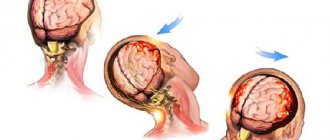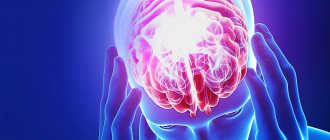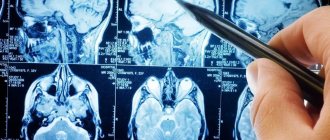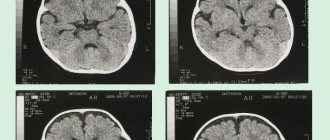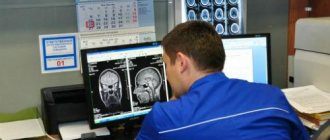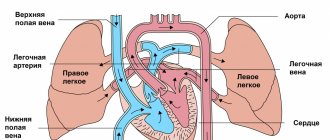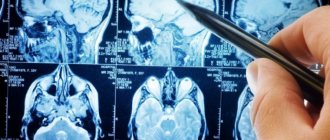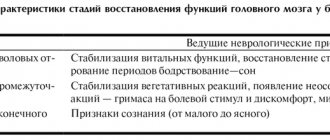Due to the structural features of the skull, the human brain is well protected from external influences. Everyday blows to the head usually do not lead to injury to the organ and are not accompanied by the appearance of alarming signs or discomfort. If you experience nausea, vomiting, dizziness, or loss of consciousness after blunt trauma to the skull, seek medical advice. Such symptoms may indicate a concussion, one of the mildest forms of TBI, which can still cause complications if left untreated. The clinical picture characteristic of the condition in most cases does not require calling an ambulance. It is important to understand which doctor to contact in case of a concussion so as not to waste valuable time.
You need to know which doctor to see so as not to waste precious time.
Features and signs of concussion
A concussion is a type of closed traumatic brain injury. Most often, the phenomenon occurs against the background of a blow to the head with a blunt object or a collision of the skull with a hard surface. A concussion can also develop when there is a sudden change in the position of the head in relation to the body, for example, when a car suddenly stops. If a person is influenced by one of the listed factors, it is recommended to calm him down and question him for complaints.
If signs of deterioration in health appear, the victim should be laid on his side on a hard surface.
He needs to place something soft but dense under his head to straighten his neck and give his body the most comfortable position.
Characteristic and indirect symptoms of a concussion:
- loss of consciousness – rarely observed in children and elderly patients. Depending on the severity of the condition, it lasts from 5 seconds to several hours. After the victim comes to his senses, he develops other signs characteristic of this form of TBI;
- headache – intense, obsessive, can have a different character and localization, intensifies with physical activity or trying to move the eyes;
- dizziness, unsteadiness of gait, poor balance;
- confusion of consciousness, which manifests itself in inhibition of reactions, the patient’s lack of understanding of what is happening, loss of orientation in space and time;
- ringing in the ears, blurred vision or double vision, difficulty concentrating on a specific object;
- nausea followed by single vomiting or without it;
- pallor or redness of the skin, increased sweating;
- changes in the quality and frequency of pulse and breathing;
- amnesia – the patient does not remember the fact of injury or the events preceding it;
- general weakness, lethargy, loss of interest in the outside world, desire to sleep;
- Indirect manifestations include speech disorders, increased sensitivity of the patient to light, smells, loud sounds, and irritability.
An indirect symptom of injury is tinnitus.
When assessing the signs, it is important to remember that each concussion case is different.
Vague symptoms that do not lead to a noticeable deterioration in the victim’s well-being also cannot be ignored. The clinical picture may become more vivid some time after the injury. Don't wait for this to happen. The sooner the patient receives help, the lower the risk of developing negative consequences.
Drawing conclusions
Strokes are the cause of almost 70% of all deaths in the world. Seven out of ten people die due to blocked arteries in the brain. And the very first and main sign of vascular blockage is a headache!
Particularly scary is the fact that most people do not even suspect that they have a disorder in the vascular system of the brain. People take painkillers - a pill for the head, thereby missing the opportunity to fix something, simply dooming themselves to death.
Blockage of blood vessels results in a disease under the well-known name “hypertension”, here are just some of its symptoms:
- Headache
- Increased heart rate
- Black dots before the eyes (floaters)
- Apathy, irritability, drowsiness
- Blurred vision
- Sweating
- Chronic fatigue
- Swelling of the face
- Numbness and chills in fingers
- Pressure surges
If you have a concussion, which doctor should you contact?
After collecting complaints, he checks the patient’s pulse and breathing, measures his blood pressure, and assesses the condition of his pupils. Doctors do all this to assess the general condition of the victim and exclude a number of other pathologies and emergency events. After this, the patient will in any case need to consult a specialized specialist - a traumatologist or neurologist. If the victim is in serious condition, both may need to intervene.
A person will definitely need to consult a specialized neurologist.
Traumatologist or neurologist?
Although a neurologist deals with various pathologies of the central nervous system, which doctor to contact if you suspect a concussion depends on the characteristics of the case. In case of a traumatic brain injury, which is accompanied by bleeding, disruption of the integrity of the bones of the skull or skin, it is better to consult a traumatologist. The same option is relevant for cases where head damage is complemented by injuries to other parts of the body. Confusion, deep fainting, and the general serious condition of the victim are also indications for intervention by a traumatologist.
If the victim has already come to his senses, his condition is satisfactory, he reacts to those around him, you can get by with a consultation with a neurologist. This scheme of action is suitable for cases when the patient, apart from a head injury, is not bothered by anything, there are no visible consequences of the blow or are reduced to a hematoma or dissection. The specialist can only make a final diagnosis and determine the severity of the injury, which is proven using basic diagnostic techniques.
Symptoms of a concussion
The manifestations of a concussion are quite varied. They include the following signs:
- Pain, dizziness, loss of balance, unsteady gait.
- Noise, ringing in the ears.
- Visual impairment: darkening of the eyes, spots.
- Loss of appetite, nausea, vomiting.
- Convulsive syndrome.
- Stunning, unclear consciousness or loss of consciousness.
- Photosensitivity and intolerance to loud noises.
- Vegetative manifestations in the form of increased sweating, weakness, redness or blanching of the skin.
All about the signs and treatment of a mild concussion.
How does recovery after a concussion proceed: medicinal and non-medicinal methods.
The state of health with a traumatic brain injury can be satisfactory. Consciousness is often clouded, the person seems to be stunned. The gait is unsteady, sparks from the eyes or darkening, double vision, and dilated pupils are possible. A noise or buzzing in the ears is typical of an injury.
Nausea is caused by irritation of the vomiting receptors in the hypothalamus. In infants, when concussed, regurgitation and crying are observed. Seizures are a consequence of overexcitation of the cerebral cortex.
Diagnosis of concussion
Contrary to popular belief, even a mild concussion can lead to dangerous complications. You should not think that in a situation where a TBI is not accompanied by obvious external damage, it is enough to undergo an examination and interview with a neurologist. Depending on the severity of the clinical picture and the age of the patient, he is prescribed magnetic resonance imaging or CT, EEG, X-ray, and vascular ultrasound. Additionally, laboratory tests and Glasgow scale tests are performed. Using all these approaches, doctors check the degree of brain damage and exclude the possibility of additional negative factors affecting the central nervous system.
Depending on the symptoms, the patient may be prescribed an EEG.
What affects the benefit amount?
The decision to assign disability to a TBI victim is usually made after discharge from the hospital. Contrary to popular belief, when calculating the amount of financial assistance, it does not take into account what signs of a concussion have persisted.
Attention is drawn to a number of other important points:
- average monthly salary indicator for the last 2 years;
- availability of additional payments for the same period and their volume;
- insurance experience;
- number of days on sick leave;
- the presence or absence of a note in medical documents indicating the patient’s non-compliance with the treatment regimen.
The amount of the benefit is influenced by the average monthly salary for the last 2 years.
When applying for disability benefits after a concussion, two more points are taken into account. Firstly, the total amount cannot exceed the maximum sick leave payment. Secondly, if the victim is injured while under the influence of alcohol or drugs, the amount of the benefit corresponds to the minimum wage.
Hospitalization in the event of a concussion in a person with a head injury allows you to choose the best treatment option, eliminate additional problems, and prevent complications. How long the victim needs to stay in the hospital should be determined by the doctor, and not by the whim of the patient.
Do they put you in hospital?
The decision on the need for hospitalization is made based on the results of the examination, laboratory test data and computer diagnostics.
This allows you to verify the correctness of the diagnosis, accustom the patient to a regimen and diet, and minimize the negative consequences of a concussion. The hospital also determines the optimal treatment option for a particular patient. Depending on the severity of the injury, hospitalization lasts on average from 3 days to a month.
Hospitalization of a patient lasts on average from 3 days to a month.
For how long is a certificate of incapacity issued?
Consent to stay in hospital after a concussion is diagnosed simplifies the process of obtaining sick leave. It starts automatically when a patient is hospitalized. Otherwise, you should visit a neurologist at the place of registration so that he can confirm the diagnosis, prescribe outpatient treatment, and issue a certificate of incapacity for work.
If the victim agrees to stay in a hospital, this simplifies the process of obtaining sick leave.
The length of time for which sick leave is issued for a concussion depends on the severity of the TBI:
- mild form - from 8 to 12 days in accordance with the characteristics of the course of the disease. In situations where the patient’s work involves increased physical activity, changes in atmospheric pressure or a number of other special conditions, it is necessary to temporarily transfer him to light work. The length of stay under special conditions is established by the commission and ranges from 2 weeks to 2 months;
- moderate severity - the victim is issued a certificate of temporary loss of ability to work for 2-4 weeks;
- severe - the average period is 1-4 months, but most often the patient’s work activity is limited until complete recovery. It should be taken into account that in cases where restoration of working capacity does not occur after 4 months, a VTEK examination is indicated. A positive outcome of the commission leads to an extension of sick leave for 1-2 months, an unfavorable outcome implies the assignment of disability.
The above principle of depending on the severity of the concussion does not apply to cases where the victim undergoes outpatient treatment. Such sick leave is usually automatically issued for 15 days, and its extension is possible only by decision of the medical commission.
In cases where restoration of working capacity does not occur after 4 months, a VTEK examination is required.
Where to go if you have a concussion
Mild and moderate concussions are usually accompanied by symptoms that do not prevent the victim from being taken to a medical facility. This could be a clinic, hospital, emergency room. The doctor on duty will examine the patient and then decide on further action. In a situation where a brain injury is accompanied by impaired consciousness, the patient’s inability to move, and a risk of spinal injury, it is better to call an ambulance by phone.
While the team is on the move, it is recommended that a person with a suspected concussion receive basic first aid. If there is bleeding, it must be stopped using bandages or a clean cloth. If a hematoma forms, cold can be applied to the site of impact. The patient is placed on his right side, with his right arm and leg bent at a right angle, and his head slightly raised. If there is a risk of spinal injury, the victim is left on his back, but when vomiting, the head should be placed on the side.
Any traumatic brain injury is a reason to seek medical help. It is not so important which doctor you contact in case of a concussion, the main thing is that this must be done quickly. If possible, it is better not to risk the victim’s health at all, but to immediately call an ambulance, whose employees will understand the situation.
First aid
The patient should be taken away from the danger area. During convulsive seizures, you need to place something soft under your head to prevent possible damage. If the victim is unconscious, you can let him smell ammonia and rub his earlobes.
When vomiting, the patient's head should be placed on one side to prevent aspiration of stomach contents into the respiratory tract. If there is bleeding, it must be stopped by applying a tourniquet or a pressure bandage.
The patient should be taken to a medical center or clinic as quickly as possible. After the examination, the neurologist will prescribe appropriate treatment at home. In severe cases, hospital therapy may be required.
Diagnosis and treatment
To make an accurate diagnosis, it is often enough to know the symptoms and causes of the pathology. The neurologist will immediately be able to guess what disease the patient is facing. Additionally, the doctor may order an examination to rule out complications.
Electroencephalography, cranial x-ray, and computed tomography may be required. Based on the results of these examinations, a diagnosis is made.
During the acute period, the person should be in the neurosurgical department. The patient was prescribed bed rest for 5 days. If there are no complications and your health has improved, then discharge from the hospital is possible in a week or 10 days. Outpatient treatment lasts approximately 14 days.
Concussions are treated with painkillers, sedatives, and antiemetic medications. It is important to relieve unpleasant symptoms that worry the patient . The person is also prescribed drugs to restore brain function.
Patients need to take nootropic drugs, as well as vasotropic drugs. They have a beneficial effect on cerebral circulation and also improve mental activity.
Each patient should individually discuss with their doctor the question of how long they will have to stay in the hospital for a concussion. It is not recommended to be discharged ahead of time, because the doctor knows better how long a person should stay in the hospital. Also, do not forget about the rehabilitation period, which takes place at home.
